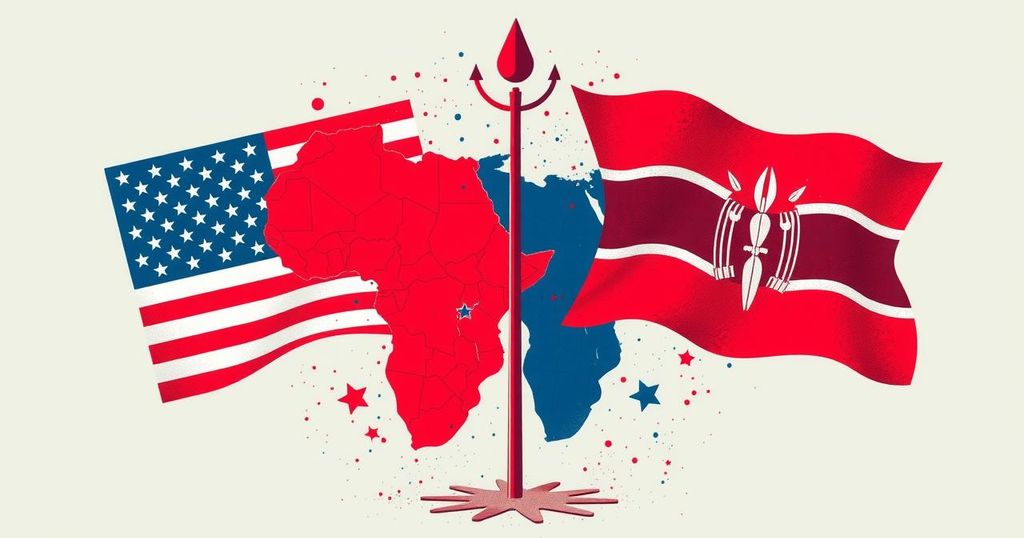U.S. Secretary of State Marco Rubio Cancels Kenya Visit Amid Concerns

U.S. Secretary of State Marco Rubio has canceled his Kenya visit scheduled for April 28, citing concerns over Kenya’s relationship with China, rising corruption, and ties with rebel groups. The decision follows Kenyan President Ruto’s recent state visit to China and reflects deteriorating U.S.-Kenya relations.
In a surprising turn of events, U.S. Secretary of State Marco Rubio has canceled his upcoming visit to Kenya, which was scheduled for April 28. This decision seems tied to increasing concerns in Washington regarding Kenya’s deepening relations with China, rising corruption within its government, and its connections with rebel groups in the region, including those in the Democratic Republic of Congo and Sudan.
Rubio’s visit was anticipated to be part of his inaugural diplomatic tour of Africa since taking office in January under President Trump. Alongside Kenya, there were plans for stops in Ethiopia. However, official sources confirmed the abrupt cancellation without providing a specific reason.
The cancellation closely follows Kenyan President William Ruto’s return from a significant five-day visit to China, where he met with several high-ranking Chinese officials, including President Xi Jinping. The goal of Ruto’s trip was to strengthen trade and investment ties, yet it has raised alarm in Washington, particularly amidst heightened U.S.-China tensions.
Accompanying this apprehension is Ruto’s criticism of Russia’s actions in Ukraine and a recent U.S. vote at the UN that sided with Moscow, adding strain to Kenya’s relationship with the U.S. Ruto’s administration has been linked to an easing of criticisms about Beijing, positioning Kenya as a key player in China’s Belt and Road Initiative since a partnership established in 2017.
Moreover, the situation has worsened following Kenya’s decision to host Sudan’s Rapid Support Forces, which has drawn further scrutiny from U.S. diplomats who express frustration over the Kenyan government’s regional engagements. This comes amid reports that the Trump administration may downsize U.S. diplomatic presence in Africa, affecting multiple embassies and consulates across the continent.
In light of the ongoing changes, various U.S. companies, which once expressed interest in significant investments in Kenya, have withdrawn, citing corruption as a substantial issue. This retreat has potentially cost Kenya billions in anticipated opportunities following Ruto’s previous White House visit.
Additionally, the recent closure of the United States Agency for International Development (USAID) operations in Kenya signifies a notable shift in bilateral relations. As of now, the Kenyan government has not publicly commented on the cancellation, though many citizens have taken to social media to express their concerns.
Steve Mbogo, an influential commentator on X (formerly Twitter), remarked, “President Ruto chose the worst time to visit China—during heightened U.S.-China tensions over tariffs. Today, he’s seen as a betrayer by his former ally, America.” Meanwhile, Machakos Deputy Governor Francis Mwangangi suggested that Secretary Rubio’s decision likely reflects growing unease over corruption and Kenya’s connections with rebel groups
Overall, the cancellation of Secretary Rubio’s visit underscores rising tensions and the precarious nature of U.S.-Kenya relations amidst shifting geopolitical alliances. Ruto’s foreign engagements, particularly with China, could have long-lasting implications for Kenya’s diplomatic landscape.
In summary, Secretary of State Marco Rubio’s cancellation of his Kenya visit highlights intensifying U.S. concerns over Kenya’s growing ties with China and ongoing domestic corruption. The timing of President Ruto’s recent visit to China has complicated U.S.-Kenya relations, raising questions about the future of American investments in Kenya and the broader implications for regional diplomacy.
Original Source: hornobserver.com








